Understanding IVF Side Effects: What to Expect
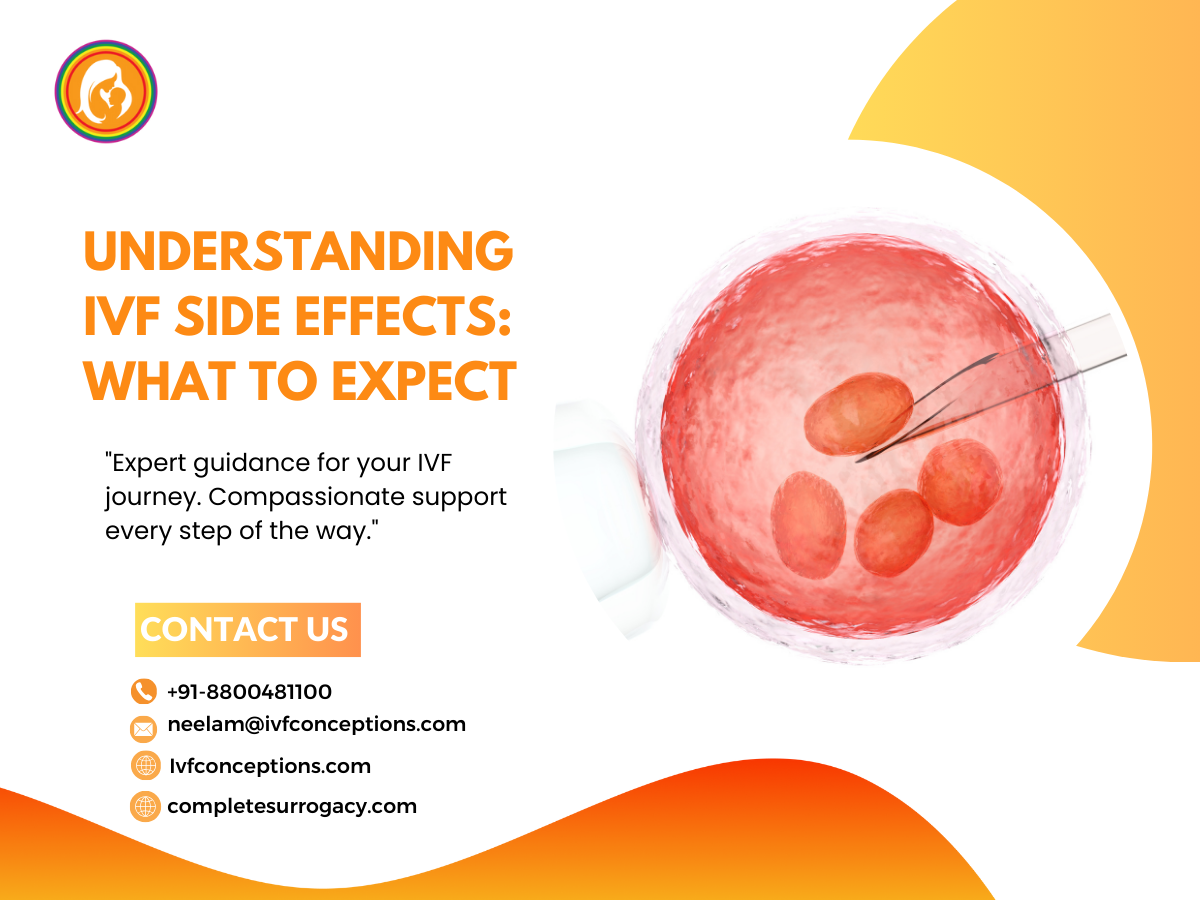
Understanding IVF Side Effects: What to Expect
Understanding IVF Side Effects: What to Expect
Starting the IVF journey can be both exciting and overwhelming. While fertility treatments are generally safe, it’s essential to understand the possible IVF side effects to navigate the process confidently.
Common IVF side effects include mild bloating, mood swings, fatigue, and cramping due to hormone medications. Some women may experience more severe reactions, such as ovarian hyperstimulation syndrome (OHSS), which can cause swelling and discomfort. Emotional ups and downs are also common, making mental health support during IVF crucial.
- Book an online appointment: Get a free online consultation.
- Call\W:+91-8800481100 Email:neelam@ivfconceptions.com
By being aware of the risks and effects of IVF treatments, you can better prepare for the journey and make informed choices. Consulting with your fertility specialist can help you manage these effects and optimize your chances of a successful pregnancy through IVF.
What are the usual side effects of IVF, and how can you handle them? This detailed guide will walk you through the potential issues. It will give you the tools to deal with them successfully.
Key Takeaways
- Fertility drugs used in IVF can cause mild side effects like hot flashes, headaches, and bloating.
- Ovarian hyperstimulation syndrome (OHSS) is a rare but serious complication that can lead to severe abdominal pain and weight gain.
- IVF does not increase the risk of miscarriage compared to natural conception, and the rates are similar.
- Ectopic pregnancy, though rare, can still occur after IVF, causing abdominal pain and vaginal bleeding.
- IVF treatment can be emotionally and financially demanding, leading to stress and strain on relationships.
More Resources To Read:
9 Factors To Improve IVF Pregnancy Rate
How To Choose Between IVF and IUI: A Comprehensive Guide
IVF With Egg Donor Success Rates
What is Mitochondrial Donation IVF Treatment
Overview of IVF Stages and Potential Side Effects
In Vitro Fertilization (IVF) is a complex fertility treatment with several stages. Each stage has its own risks. It’s key for those starting IVF to know these stages and risks.
The Stages of In Vitro Fertilization (IVF)
The IVF process has four main stages: suppression, stimulation, egg retrieval, and embryo transfer. Each stage is crucial for a successful pregnancy. But, they also come with side effects that patients should know about.
Side Effects to Expect at Each Stage
At the suppression stage, patients might feel spotting, breast tenderness, and mood swings. The stimulation stage, where fertility meds boost ovary activity, can cause headaches, hot flashes, nausea, bloating, and bruising at injection sites.
Egg retrieval can lead to soreness, spotting, constipation, bloating, cramping, fatigue, nausea, and vomiting. Rarely, Ovarian Hyperstimulation Syndrome (OHSS) can happen, needing quick medical care.
The embryo transfer stage usually has fewer side effects. But, patients might still feel breast tenderness and bloating. The whole IVF process can take 2-3 weeks, depending on the situation.
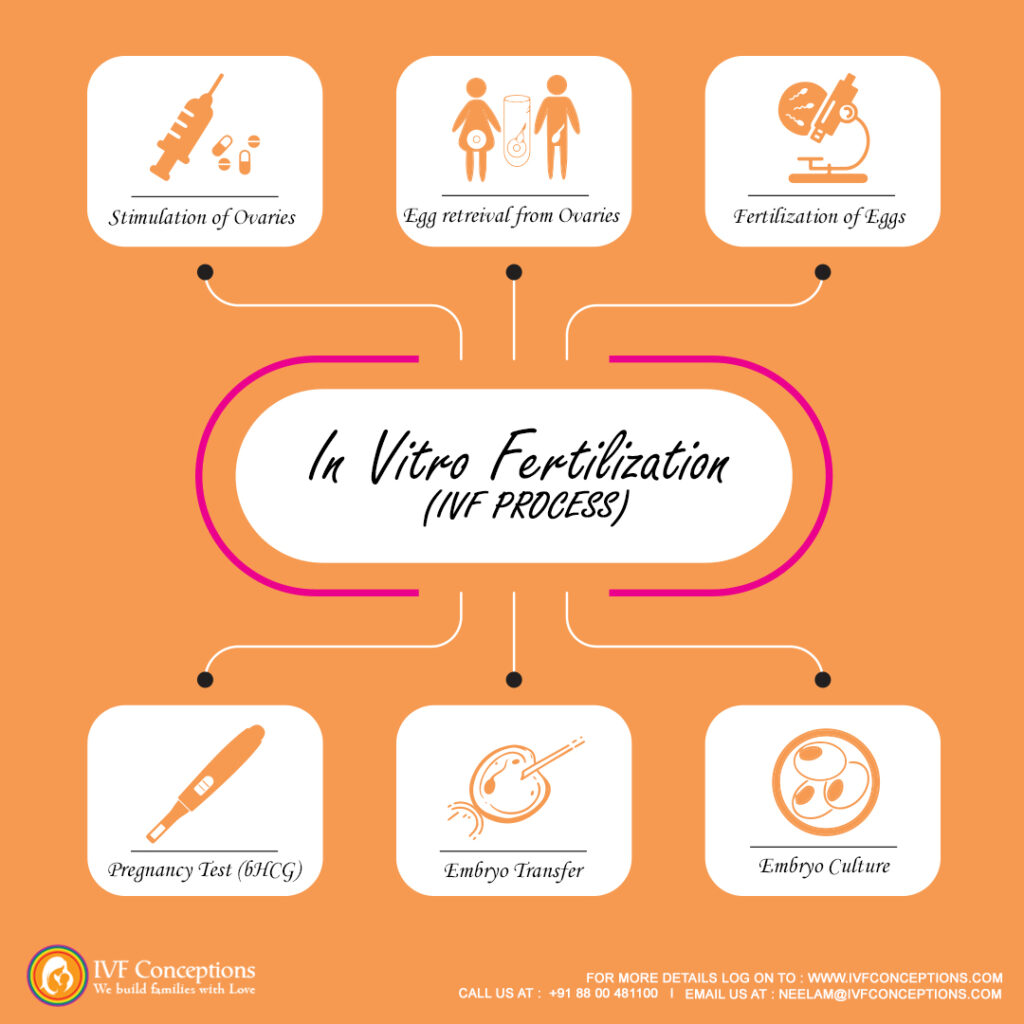
Stage 1: Suppression and Its Side Effects
The first step in IVF is called suppression. It uses oral contraceptives to “quiet” the ovaries. This makes all the follicles mature at the same time, increasing the number of eggs retrieved. But, this stage has its own side effects.
What Happens During Suppression?
You’ll get meds like Lupron or Cetrotide/ganirelix during this stage. These stop your ovaries from releasing eggs early. This helps your doctor control when your eggs are ready.
Common Side Effects of Suppression
Medicines for ovulation suppression can cause side effects, such as:
- Hot flashes and mood swings
- Breast tenderness
- Nausea and bloating
- Headaches
- Fatigue
These effects are usually mild and can be handled. But, talk to your fertility team if they’re bothering you. They might change your meds or suggest ways to ease the side effects.
Drinking plenty of water, resting well, and doing some light exercise can lessen suppression side effects. Knowing what to expect helps you manage your IVF better.
Stage 2: Stimulation and Its Challenges
The stimulation stage of IVF is key. It involves daily injections of fertility medications. These meds help grow and mature many follicles. But, this stage has its own challenges and side effects.
The Role of Injections in Stimulation
Patients get injections during the stimulation stage. They take follicle-stimulating hormone (FSH) and luteinizing hormone (LH). These hormones make the ovaries work harder. This leads to many mature eggs ready for fertilization.
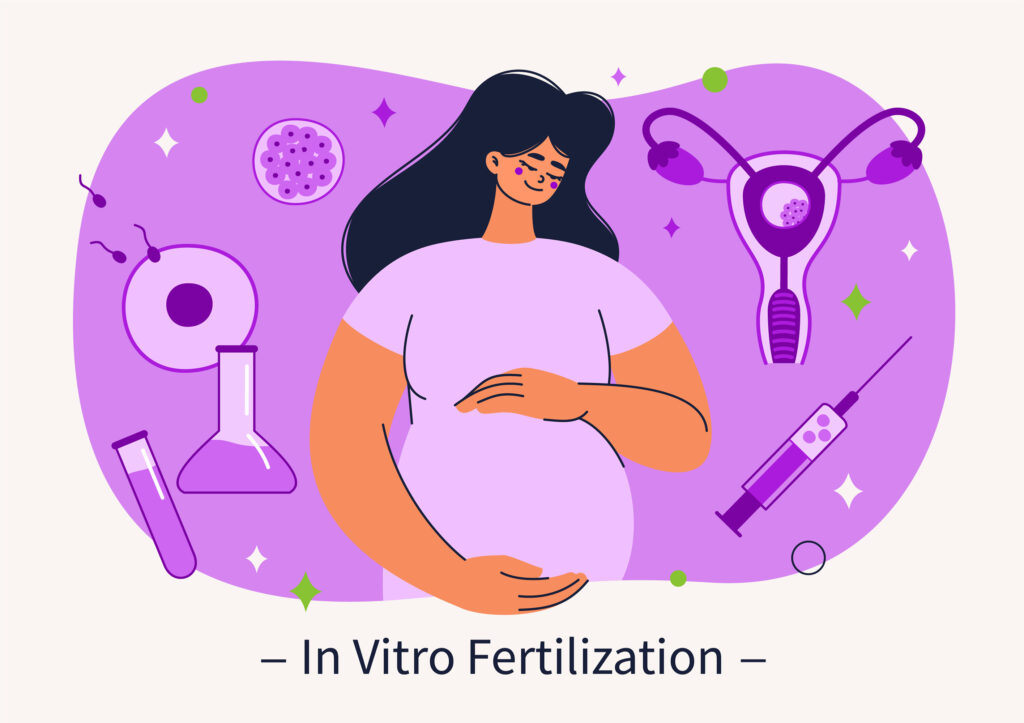
Potential Side Effects During Stimulation
- Headaches: Many patients get headaches due to hormonal changes and the ovaries’ increased activity.
- Hot Flashes: Some feel sudden warmth and sweat as a side effect of the hormones.
- Nausea: Mild to moderate nausea can happen as the egg retrieval gets closer.
- Bloating: Feeling bloated or uncomfortable in the belly comes from fluid retention and growing follicles.
- Breast Tenderness: The ovaries’ stimulation makes breasts feel sore, tender, or swollen.
- Bruising: Injection sites might bruise, especially if you bruise easily or have trouble with injections.
- Fatigue: The hormonal changes and the effort needed for the stimulation make you feel tired and exhausted.
As the egg retrieval comes closer, these side effects get worse. They show the stimulation worked well and the eggs are ready.
Stage 3: Egg Retrieval and Recovery
The egg retrieval stage is a key part of the IVF process. In this step, a fertility specialist takes out the mature eggs from the ovaries. This whole process, from getting anesthesia to finishing, only takes about 10-15 minutes.
Understanding the Egg Retrieval Process
The timing for egg retrieval is very precise. It depends on how the follicles are growing and when the trigger shots are given. Usually, it happens around 10-12 days after starting the hormone treatments. Younger women tend to get more eggs.
Side Effects After Egg Retrieval
After the retrieval, the ovaries are swollen and sore. You might feel some pain, spotting, constipation, bloating, cramps, tiredness, nausea, or vomiting. These symptoms are usually mild and go away in a few days. But, if you have severe symptoms like quick weight gain or trouble breathing, call your doctor right away. These could be signs of a serious condition called ovarian hyperstimulation syndrome (OHSS).
Before the surgery, follow the doctor’s instructions. Wear comfy clothes, come early, and have a ride home ready. The surgery is done under anesthesia care to make you comfortable and help you recover faster. Afterward, rest a lot and avoid hard work. You might need to drink more water and use stool softeners if you get constipated.
The egg retrieval stage is a vital part of IVF. Knowing what to expect and how to recover can make the process easier for patients.
Ovarian Hyperstimulation Syndrome: A Rare Complication
IVF can sometimes cause a rare but serious issue called ovarian hyperstimulation syndrome (OHSS). OHSS happens when the body overreacts to fertility drugs, leading to too much fluid in the body.
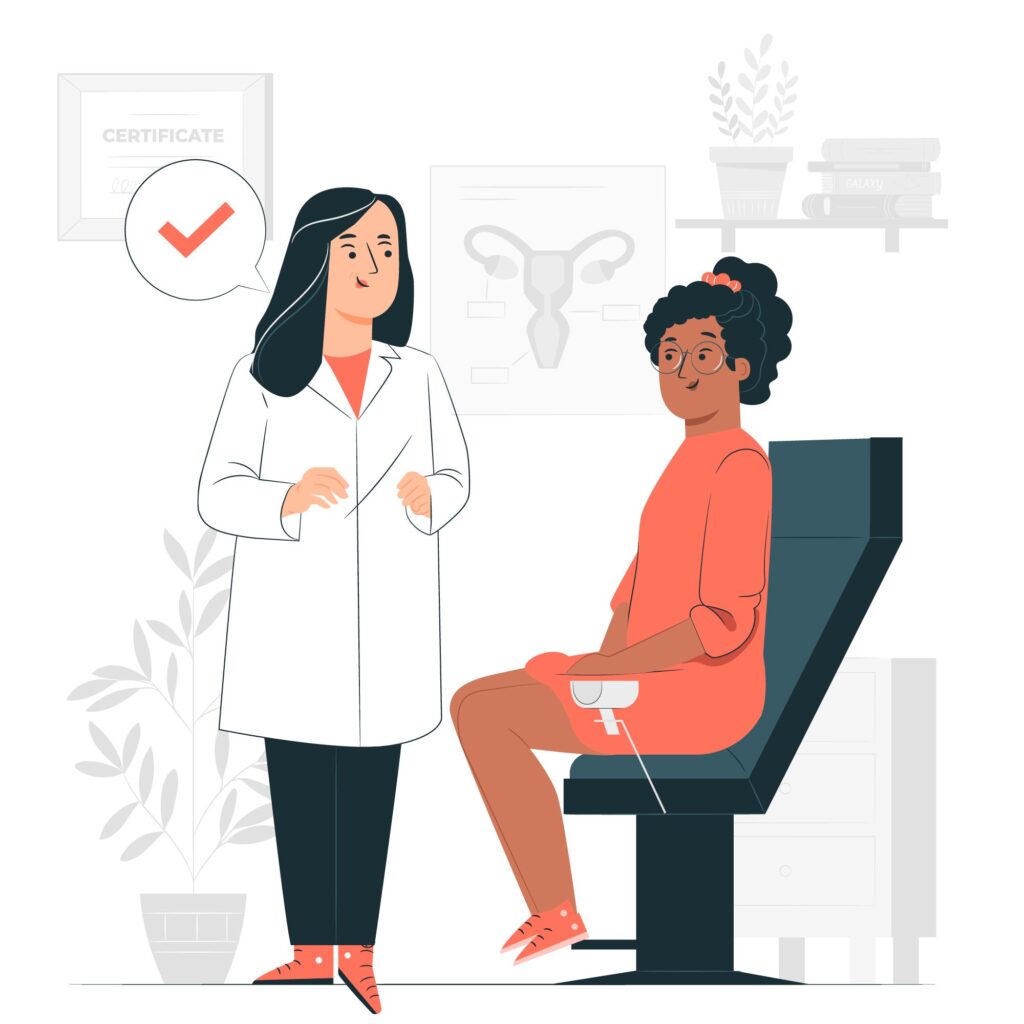
For mild OHSS, rest and staying hydrated can help. But severe cases need quick medical help. About 3% to 6% of women doing IVF might get OHSS. Young women (under 35) and those with polycystic ovarian syndrome are more at risk.
The risk factors for OHSS include:
- A very high estrogen level during fertility treatments
- Developing an unusually large number of ovarian follicles
- Polycystic ovarian syndrome
- Low body weight
OHSS symptoms can be mild or severe. Mild symptoms are things like bloating, some belly pain, and gaining weight. But severe OHSS can cause a lot of weight gain, a lot of belly pain or swelling, not being able to pee, trouble breathing, feeling sick, vomiting, diarrhea, and even blood clots.
In rare cases, OHSS can become very serious. This can lead to blood clots, kidney failure, big problems with electrolytes, and a lot of fluid in the belly or chest. If you have any worrying symptoms during or after IVF, call your fertility team right away.
To lower the chance of OHSS, doctors might change how much medicine you take, add more medicine, or suggest “coasting” (stopping some injectable medicines for a bit). They also watch your hormone levels and how your ovaries are doing closely during IVF.
Stage 4: Embryo Transfer and Its Aftermath
The embryo transfer is a key part of IVF. It’s when the chosen embryo(s) are put into the uterus to help get pregnant. Even though it’s less invasive than egg retrieval, patients might feel some side effects like breast tenderness and bloating.
The Embryo Transfer Procedure
The embryo transfer is a simple process. A thin, flexible catheter is used to place the embryo(s) into the uterus. This takes a few minutes and might cause mild discomfort or cramping.
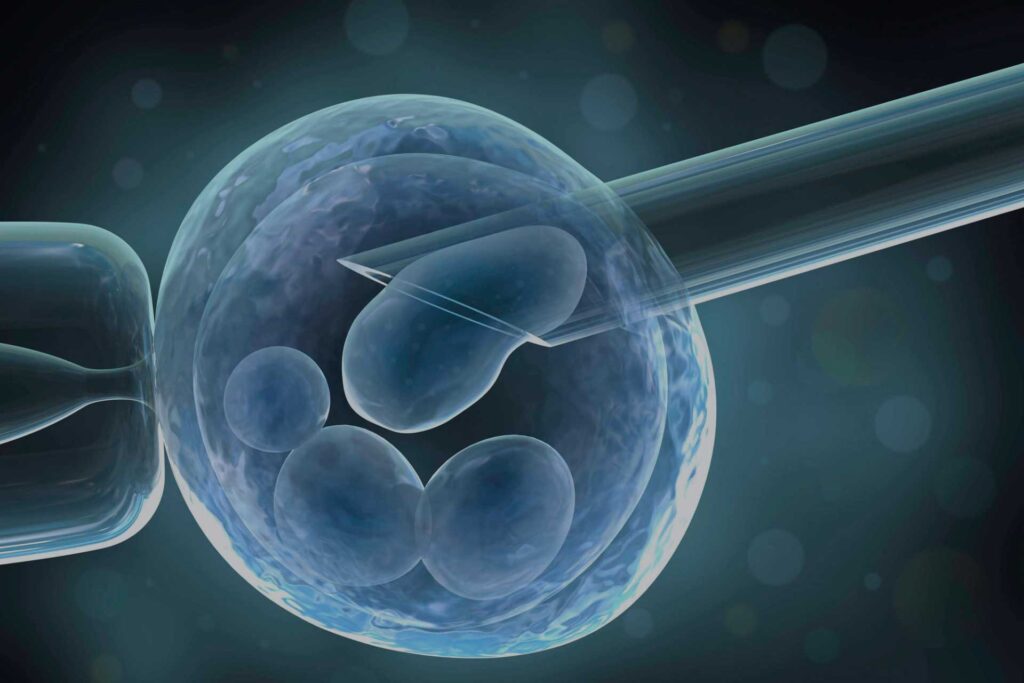
Post-Transfer Side Effects and Recommendations
After the transfer, patients might feel fatigue, breast tenderness, and bloating due to hormonal changes. It’s crucial to follow your fertility team’s advice, such as avoiding heavy lifting and intense exercise. This helps create the best conditions for implantation. While you don’t need to rest in bed, it’s best to keep activities light for a few days.
Some patients might not feel any side effects but could still test positive for pregnancy. Waiting at least 10 days after the transfer to take a pregnancy test is best. This is because the embryo usually attaches within 48 to 72 hours after the transfer. HCG can be detected 9 to 10 days after the transfer.
Other Potential IVF Risks and Complications
IVF has well-known physical side effects, but its emotional and financial impact is just as big. The hormonal changes, many clinic visits, and invasive procedures can really take a toll on your mind and body. This leaves patients feeling overwhelmed and drained.
- Emotional and Psychological Toll
The emotional side of IVF can be very deep, especially if it doesn’t work out. Patients might feel grief, anxiety, depression, and frustration. It’s important to have a strong support system and think about getting professional counseling if you need it.
- Financial Considerations
IVF can cost between $12,000 to $15,000 per cycle, which is a big financial burden. It’s key to understand the cost and look into financing options like insurance, payment plans, and fertility financing programs before starting.
The IVF process and its risks can seem scary, but being informed and prepared helps. Knowing about the emotional and financial sides, as well as the physical risks, helps patients make better choices. It also helps them find the support they need for their IVF journey.
More Resources To Read:
Surrogacy Guide for Surrogate Mothers
Surrogacy Guide for Intended Parents
How does the surrogacy process work
Conclusion
IVF is a complex process that can help people with infertility. But, it’s important to know the possible side effects and risks. These can include things like ovarian hyperstimulation syndrome (OHSS), multiple pregnancies, and emotional issues.
Most IVF side effects can be managed with the right care. It’s key for patients to talk with their healthcare team about risks and how to handle them. Getting emotional support and understanding the costs of IVF is also crucial.
Being informed and proactive helps patients face IVF challenges better. With the right support, the benefits of IVF can be huge. This can make it possible for people to start a family.
If you’d like to learn more about IVF, Egg Donation, or surrogacy services globally, check out the rest of our website at Complete Surrogacy Agency. We offer legally secure and affordable surrogacy consulting services for FREE.
Complete Surrogacy: Your Trusted Partner in International Surrogacy
At Complete Surrogacy, we have over 15 years of experience in international surrogacy, guiding 4,000+ intended parents worldwide. We provide safe, ethical, and affordable surrogacy solutions for single parents, LGBTQ+ couples, and heterosexual couples.
As members of EFS and ESHRE, we adhere to the highest ethical and professional standards. Our expert team is committed to providing accurate, compassionate, and transparent guidance, ensuring a legally secure and smooth journey to parenthood.
Let us help you build your family with trust, care, and integrity.
Get in touch for one FREE Surrogacy Consultancy!

FAQs for side effect of IVF Process
What are the common side effects of the IVF process?
IVF has several stages, each with its own side effects. In the suppression stage, you might feel spotting, breast tenderness, and mood swings. The stimulation stage brings headaches, hot flashes, nausea, bloating, and bruising from injections.
During egg retrieval, you could feel soreness, spotting, constipation, bloating, cramping, fatigue, nausea, and vomiting.
What is ovarian hyperstimulation syndrome (OHSS) and how serious is it?
OHSS is a rare but serious issue from IVF medications. It’s an overreaction to the fertility drugs, causing too much fluid in the body. Symptoms include bloating, abdominal pain, less urine, shortness of breath, and quick weight gain.
Mild cases can be treated with rest and lots of water. But severe cases need urgent medical help.
What can I expect during the embryo transfer stage of IVF?
The embryo transfer stage usually has fewer side effects. You might feel breast tenderness and bloating. It’s key to follow the post-transfer advice, like avoiding heavy lifting and intense exercise, to help the embryo implant well.
While you don’t need to stay in bed, plan for light activities in the first few days after the transfer.
What are the emotional and financial considerations of IVF treatment?
IVF affects not just your body but also your emotions and wallet. The hormonal changes, many clinic visits, and detailed procedures can be tough on your mind. Having a strong support system and maybe counseling can help.
The cost of IVF, from $12,000 to $15,000 per cycle, is a big concern. It’s important to understand the financial commitment and look into all financing options before starting.
Source Links
- https://www.scrcivf.com/ivf-side-effects-understanding-the-risks/ – IVF Side Effects: Understanding the Risks
- https://carolinasfertilityinstitute.com/risks-side-effects-ivf/ – What Are The Risks And Side Effects Of IVF? | Carolinas Fertility Institute
- https://www.nhs.uk/conditions/ivf/risks/ – IVF
- https://www.illumefertility.com/fertility-blog/in-vitro-fertilization-ivf-side-effects-at-each-stage – In Vitro Fertilization (IVF) Side Effects at Each Stage
- https://www.mayoclinic.org/tests-procedures/in-vitro-fertilization/about/pac-20384716 – In vitro fertilization (IVF) – Mayo Clinic

Author Bio: Neelam Chhagani is an International Surrogacy Expert with 15 years of experience in the fertility and surrogacy domain. As the founder of IVF Conceptions and Complete Surrogacy, she has guided over 4,000 intended parents worldwide on their surrogacy journey to parenthood. Recognized as a trusted authority, she specializes in holistic infertility solutions and third-party reproduction consulting.
Holding an MA in Counselling Psychology and a PGD in Mental Health, Neelam is a proud member of the European Fertility Society (EFS) and the European Society of Human Reproduction and Embryology (ESHRE). She is also a leading surrogacy blogger, providing valuable insights into ethical and practical surrogacy solutions.
Since 2010, committed to supporting ALL family types, Neelam has been passionate about helping intended parents grow their families with compassion, integrity, and a focus on secure and affordable surrogacy options Globally.
Learn more about Neelam:
https://www.ivfconceptions.com/neelam-chhagani-surrogacy-consultant/
https://www.linkedin.com/in/neelam-chhagani-92892229/















I was introduced to Neelam by a friend who worked with Neelam for surrogacy. Neelam is absolutely wonderful. I am a single male and the journey to fatherhood is not that easy. Neelam connected me to a program ideal for my circumstances. She was with me throughout the pregnancy providing advice and guidance along the way. I am so grateful I found her and am thrilled today that I have a beautiful daughter. I highly recommend Neelam to anyone who is on a journey to become a parent. Having a child has changed my world for the better. I wish others success with their own journey and recommend you connect with Neelam to find a path that is best for you.
SA (USA)